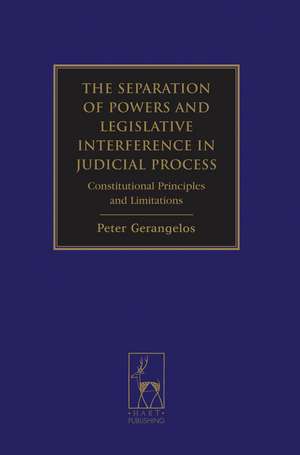The Separation of Powers and Legislative Interference in Judicial Process: Constitutional Principles and Limitations
Autor Peter Gerangelosen Limba Engleză Hardback – 9 apr 2009
Preț: 572.06 lei
Preț vechi: 817.86 lei
-30% Nou
Puncte Express: 858
Preț estimativ în valută:
109.46€ • 114.60$ • 90.57£
109.46€ • 114.60$ • 90.57£
Carte tipărită la comandă
Livrare economică 07-21 aprilie
Preluare comenzi: 021 569.72.76
Specificații
ISBN-13: 9781841136615
ISBN-10: 1841136611
Pagini: 328
Dimensiuni: 156 x 234 x 25 mm
Greutate: 0.68 kg
Editura: Bloomsbury Publishing
Colecția Hart Publishing
Locul publicării:London, United Kingdom
ISBN-10: 1841136611
Pagini: 328
Dimensiuni: 156 x 234 x 25 mm
Greutate: 0.68 kg
Editura: Bloomsbury Publishing
Colecția Hart Publishing
Locul publicării:London, United Kingdom
Caracteristici
This book examines the constitutional principles governing the relationship between legislatures and courts at that critical crossroads of their power where legislatures may seek to intervene in the judicial process.
Notă biografică
Dr Peter A Gerangelos is the Associate Dean (Undergraduate Studies) and Senior Lecturer in Law at the Faculty of Law, University of Sydney, Australia. He was previously Principal Solicitor in the Office of the Australian Government Solicitor.
Cuprins
1 Introduction I. The Relevant Scenarios II. Definitional Difficulties III. The Original Legal Entrenchment of the Doctrine andthe Underlying Rationale IV. The Possibility of General Principles andInterpretational Methodology V. The Purposive Nature of The Separation of PowersDoctrine VI. The Problem of Definition and the Formalist Approach VII. Core Branch Functions? 2 Legislative Interference in the Pending Case Scenario: TheFoundation of Principle and the Australian Position I. Introduction II. The Australian Constitutional Position and the EarlyAustralian Constitutional Scholars III. Early Development of Principle by the High Court IV. The Foundation of a Discrete Set of PrinciplesGoverning the Pending Case Scenario: Liyanage v R V. Consolidation of Principle Post-Liyanage VI. The Direction Rule at the Crossroads: Nicholas v TheQueen VII. The Uncertain Status of the Direction Principle inAustralia 3 Legislative Interference with Judicial Functions: TheJurisprudence of the United States, Evaluation of Principle, andTowards Resolution I. Introduction II. The Emergence of the Changed Law Rule and theDirection Principle in the United States III. Klein and Its Uncertain Meaning IV. Hart's Thesis and the United States Foundation of theDirection Principle V. The Decline of the Direction Rule: The Robertson Case VI. Robertson's Uncertain Legacy: Plaut v Spendthrift Farm Inc VII. Klein Qualified, Overruled or Misinterpreted? Miller vFrench VIII. The Schiavo LitigationIX. Further Confirmation of the Direction Principle X. General Conclusions on the Separation of Powers andthe Pending Case Scenario XI. Towards a Resolution XII. A Reformulated Direction Principle XIII. Speculative Propositions XIV. Conclusion 4 The Separation of Powers and Final Judgments: Defining thePrinciple Limiting Legislative Revision of Final Judgments I. Introduction and Definition of Final Judgment II. Reflections on Finality Where the Separation Doctrineis Not Entrenched III. A Middle Case: India IV. Early Australian Commentary on the ConstitutionalProtection of Final Judgments V. The Current Australian Position VI. Qualifications VII. A Reinforcement of Australian Jurisprudence: TheIrish Position on Final Judgments VIII. The United States Supreme Court and Final Judgments IX. The Wheeling Bridge Qualification X. The Development and Consolidation of Principle bythe United States Supreme Court XI. The Inviolability Principle Tested: Miller v French XII. Conclusion 5 Qualifications to the Inviolability of Final Judgments andFinal Summation I. Introduction II. The Wheeling Bridge Qualification, the Regulation ofPublic Rights and 'Conditional' Final Judgments III. The Waiver Qualification IV. Conclusions on the Final Case Scenario 6 Protections Afforded Decisional Independence in Jurisdictionswithout an Entrenched Separation of Powers I. Introduction II. The United Kingdom and the Separation of Powers III. The European Convention on Human Rights IV. The United Kingdom, the ECHR and the HumanRights Act 1998. V. Canons of Statutory Intepretation 7 Conclusion
Recenzii
...a fascinating topic, and Gerangelos is someone who obviously knows the material incredibly well, and has thought deeply on the question of the nature of the separation of powers...Anyone who is deeply interested in the question of the legislative-judicial relationship will find this analysis to be thorough and illuminating.
Peter Gerangelos's book, focusing on when legislative interference in the judicial process is legitimate, is a welcome addition to this literature.Gerangelos's book is perhaps the most comprehensive monograph analysing the law related to the problem of legislative interference in the judicial process. It is thorough and detailed, well researched, and provides an up-to-date statement of the current situation in several important common law countries. It will be useful to jurists seeking to understand how the law in this area developed over the past century and the problems that have resulted from this development.
Peter Gerangelos's book, focusing on when legislative interference in the judicial process is legitimate, is a welcome addition to this literature.Gerangelos's book is perhaps the most comprehensive monograph analysing the law related to the problem of legislative interference in the judicial process. It is thorough and detailed, well researched, and provides an up-to-date statement of the current situation in several important common law countries. It will be useful to jurists seeking to understand how the law in this area developed over the past century and the problems that have resulted from this development.
Descriere
This book examines the constitutional principles governing the relationship between legislatures and courts.
